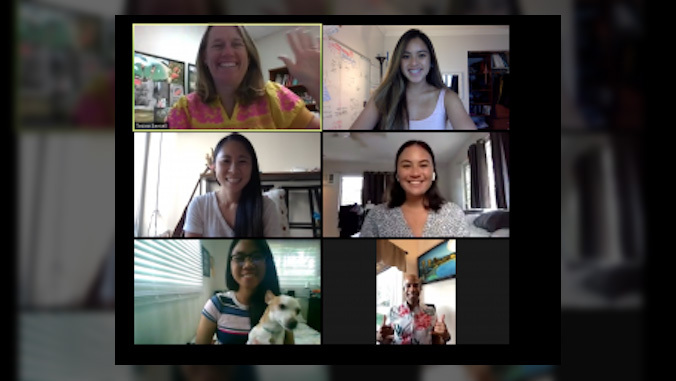
In summer 2020, University of Hawaiʻi at Mānoa students and faculty in nursing, medicine, public health and social work came together as an interdisciplinary team to help respond to the pandemic as part of the Hawaiʻi Emergency Management Agency (HI-EMA) Community Care Unit. Their efforts were featured in the February 2021 issue of the Hawaiʻi Journal of Health and Social Welfare (PDF).
The Community Care and Outreach Unit was established under the HI-EMA Emergency Support Function 8 and led by Kristine Qureshi, associate dean of research and global health in the School of Nursing and Dental Hygiene, to identify vulnerable populations and articulate their social needs. Tetine Sentell, director of the Office of Public Health Studies from the Thompson School of Social Work & Public Health, led the interdisciplinary student team.
The team conducted a statewide survey aimed at assessing capacity, needs and threats to agencies that provide health and social services in support of the state’s vulnerable populations. The survey report found that major issues for individuals revolve around securing basic needs (food, housing and access to services), mental health, job loss and resulting financial problems, and COVID-19 concerns (adequate PPE, cleaning supplies, quarantine, testing issues).
The authors describe the results of the effort and profile the learning experiences of student team members. The students provided valuable contributions to the urgent COVID-19 response, enhanced their own knowledge and learning, as well as helped to build a stronger future for the community with new networks and an understanding of new perspectives from collaborative learning opportunities.
The UH Mānoa students included:
- Sydney Unciano, a master’s student in public health specializing in social and behavioral sciences, who was the first author on the article.
- Kira Oyama, a graduate nursing student in population health and registered nurse in the intensive care unit.
- Chelsea Emma Apo, a graduate nursing student with a background in acute care nursing and public health.
- Fary Maldonado, a PhD student in social work with a focus on development of interventions for transitioning veterans, community-based research and cross cultural issues.
- Angel Lynn Talana, a master’s student in public health specializing in social and behavioral health sciences.
Unciano said she is appreciative of the experience and the mentorship provided through the project, adding “As the COVID-19 pandemic continues, it is evident that this emergency will require the insights of various disciplines at many different levels. I am optimistic that the continuing efforts of HI-EMA and other associated organizations will be able to provide support during this time of need.”
Contributing authors and UH Mānoa faculty also include: Lee Buenconsejo-Lum from the John A. Burns School of Medicine, and Rachel Burrage and Robin Arndt from the Department of Social Work in the Thompson School of Social Work & Public Health
For more information about the HI-EMA Community Care Unit, contact Qureshi at kqureshi@hawaii.edu.
This effort/work/program/research/outreach/event is an example of UH Mānoa’s goal of Enhancing Student Success (PDF), one of four goals identified in the 2015–25 Strategic Plan (PDF), updated in December 2020.

